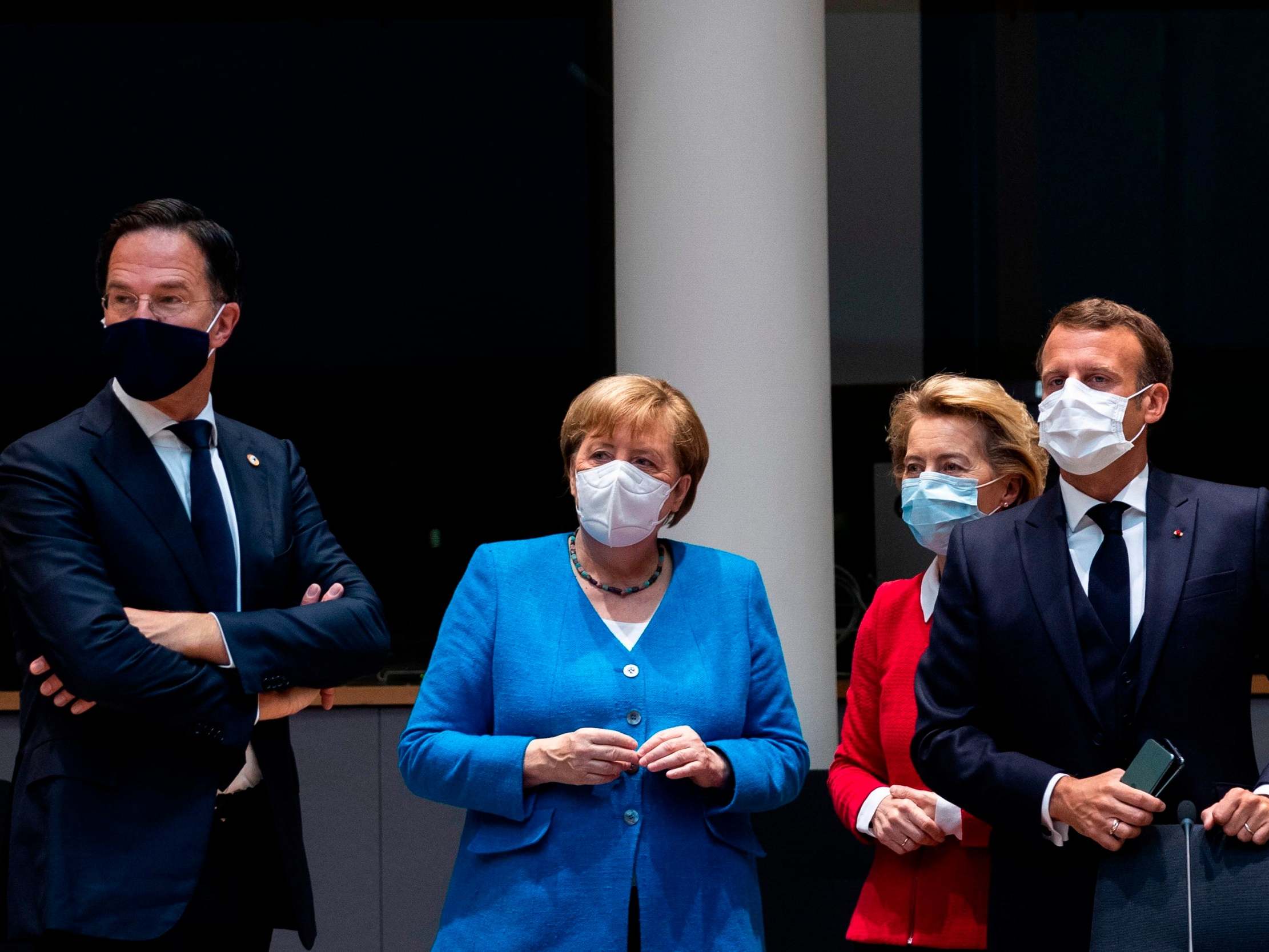EU coronavirus recovery plan hanging in balance as Merkel warns of possibility of ‘no solution’ from third day of talks
Doubts raised over success of negotiations at ‘make-or-break’ summit for bloc

Your support helps us to tell the story
From reproductive rights to climate change to Big Tech, The Independent is on the ground when the story is developing. Whether it's investigating the financials of Elon Musk's pro-Trump PAC or producing our latest documentary, 'The A Word', which shines a light on the American women fighting for reproductive rights, we know how important it is to parse out the facts from the messaging.
At such a critical moment in US history, we need reporters on the ground. Your donation allows us to keep sending journalists to speak to both sides of the story.
The Independent is trusted by Americans across the entire political spectrum. And unlike many other quality news outlets, we choose not to lock Americans out of our reporting and analysis with paywalls. We believe quality journalism should be available to everyone, paid for by those who can afford it.
Your support makes all the difference.The EU’s coronavirus recovery plan is hanging in the balance as leaders quarrelling over the level of spending for the bloc entered their third day of negotiations on Sunday.
After two days of tense discussions in Brussels, the 27 EU member states on Sunday failed to reach a compromise.
A deal envisaging €400bn in grants – down from a proposed €500bn – was rejected by the north, which said it saw €350bn as the maximum.
Earlier German chancellor Angela Merkel cast doubt over the success of the talks by suggesting that an agreement might be beyond reach.
“Whether there will be a solution, I still can’t say,” Ms Merkel said as she arrived early for the talks.
“There is a lot of good will, but there are also a lot of positions. So I will join in working for it. But there may also be no result today.”
Meanwhile, Austria’s chancellor Sebastian Kurz said a deal was possible but there was still “a way to go” at the summit.
Disagreements remain over the size of the fund and the split between grants and repayable loans, with countries such as the Netherlands trying to limit the use of grants.
The talks, which some fear could be a “make-or-break” moment for the bloc, have underscored the gulf between the EU’s north and south and raised serious questions about the viability of the union.
A €1.8 trillion (£1.6 trillion) package for the EU’s next long-term budget and a recovery fund to haul Europe out of its deepest recession since the Second World War are on the table at the summit.
The proposed €750bn recovery fund, which is to be raised on capital markets by the EU’s executive European Commission, would be funnelled mostly to hard-hit Mediterranean countries.
One contentious issue in the talks is a proposed new rule-of-law mechanism which could freeze funding to countries flouting democratic principles.
Hungary, backed by its Eurosceptic ally Poland, has threatened to veto the package over the rule-of-law mechanism, which is supported by the Netherlands.
Dutch prime minister Mark Rutte’s position has been informed by political difficulties in his country, where voters have objected to the Netherlands being, proportionately, among the largest net contributors to the EU budget.
Mr Rutte and his conservative VVD party are also facing a strong challenge from far-right Eurosceptic parties in elections next March.
Viktor Orban, Hungary’s far-right prime minister, has claimed the Dutch leader has a personal grudge against him.
“I don’t know what is the personal reason for the Dutch prime minister to hate me or Hungary, but he is attacking so harshly,” Mr Orban told reporters.
“I don’t like blame games but the Dutchman is the real responsible man for the whole mess.”
On Saturday, Ms Merkel and French president Emmanuel Macron walked out of heated talks with the so-called frugal countries.
The two leaders have refused to water down their proposals for aid and objected to plans for the level of free grants in the package to fall below €400bn.
Giuseppe Conte, Italy’s prime minister, had earlier accused the Netherlands and its allies, Austria, Sweden, Denmark and Finland, of “blackmail” in the talks.
Additional reporting by agencies
Join our commenting forum
Join thought-provoking conversations, follow other Independent readers and see their replies
Comments